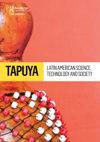What roles do civil society organizations play in monitoring and reviewing the Sustainable Development Goals? An exploration of cases from Ecuador, Colombia, and Argentina
IF 1.2
Q2 HISTORY & PHILOSOPHY OF SCIENCE
Tapuya: Latin American Science, Technology and Society
Pub Date : 2022-11-21
DOI:10.1080/25729861.2022.2143669
引用次数: 4
Abstract
ABSTRACT The UN 2030 Agenda and its Sustainable Development Goals (SDGs) constitute an international roadmap to end poverty, revert environmental degradation, and fight socio-economic inequalities. Monitoring and reviewing (M&R) processes can expose countries’ success or failure in achieving the SDGs. However, SDG M&R is a daunting task. Current mechanisms mainly rely on national statistics that lack the necessary spatial and temporal granularity. Building on policy and academic discussions about the potential of citizen science data to fill data gaps in compilations for the SDG framework, we study projects implemented by civil society organizations (CSOs) in Ecuador, Colombia, and Argentina. Through a theory-sensitive empirical analysis, we systematize five main roles through which CSOs engage in SDG M&R. These roles are (1) participation promoter, (2) information provider, (3) data innovator, (4) watchdog, and (5) advocacy. These roles encompass key activities such as making SDG-relevant data available to citizens, enhancing data literacy, promoting open data from governmental institutions to enhance transparency and accountability, producing counter-narratives, and encouraging collaboration for data collection. Despite differences in their political qualities and politicizing effects, all five roles contribute to the enabling environment for collective action that is needed in governance for the SDGs.民间社会组织在监测和审查可持续发展目标方面发挥什么作用?对厄瓜多尔、哥伦比亚和阿根廷病例的探讨
联合国2030年议程及其可持续发展目标(sdg)构成了消除贫困、恢复环境退化和消除社会经济不平等的国际路线图。监测和审查过程可以揭示各国在实现可持续发展目标方面的成功或失败。然而,可持续发展目标M&R是一项艰巨的任务。目前的机制主要依赖于缺乏必要的时空粒度的国家统计数据。在关于公民科学数据填补可持续发展目标框架汇编数据缺口的潜力的政策和学术讨论的基础上,我们研究了厄瓜多尔、哥伦比亚和阿根廷民间社会组织实施的项目。通过对理论敏感的实证分析,我们将公民社会组织参与可持续发展目标M&R的五个主要角色系统化。这些角色是(1)参与促进者,(2)信息提供者,(3)数据创新者,(4)监督者,(5)倡导者。这些角色包括向公民提供与可持续发展目标相关的数据、提高数据素养、促进政府机构开放数据以提高透明度和问责制、制作反叙事以及鼓励数据收集方面的合作等关键活动。尽管这五种角色的政治性质和政治化效果各不相同,但它们都有助于创造有利的环境,以促进可持续发展目标治理所需的集体行动。
本文章由计算机程序翻译,如有差异,请以英文原文为准。
求助全文
约1分钟内获得全文
求助全文
来源期刊

Tapuya: Latin American Science, Technology and Society
Social Sciences-Social Sciences (all)
CiteScore
1.60
自引率
0.00%
发文量
39
审稿时长
19 weeks
 求助内容:
求助内容: 应助结果提醒方式:
应助结果提醒方式:


